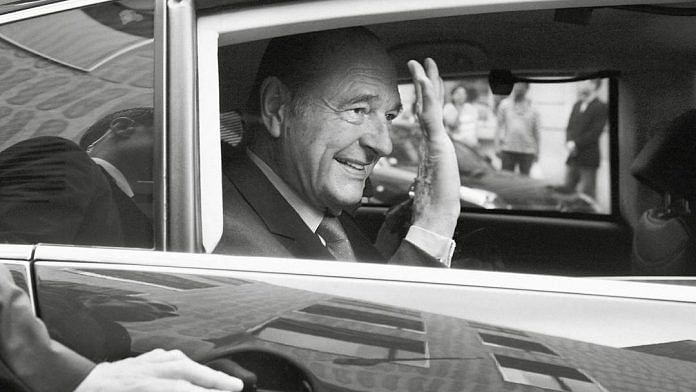New Delhi: Jacques Chirac, the former French President who passed away Thursday at the age of 86, was among the first world leaders who thought India was much more than a country of snake-charmers and Rajasthani palaces.
Chirac, who served as President of France from 1995 to 2007, instead saw India as a strategic and emerging power, which had the potential to be a force to reckon with in global geopolitics.
From Indira Gandhi to Manmohan Singh, Chirac enjoyed a good relationship with a multitude of Indian leaders, as the country took baby steps towards proving his vision of becoming a global power.
“Chirac saw India beyond just snake-charmers and Jodhpur… He viewed India as a major and emerging superpower and at par with China. He was the first French leader to understand India. He took a bet on India that paid off,” said Mohan Kumar, India’s former ambassador to France and chairman of the Research and Information System for Developing Countries (RIS).
Resolute support after Pokhran 1998
An ardent follower of one of the greatest French heroes, Charles De Gaulle, Chirac was the first Western leader to visit India post the declaration of Emergency — he arrived in 1976 as the Prime Minister of France, viewing it as an “internal matter” of India, and carried on with usual business during the trip.
Twenty-two years later, he came back to India as the chief guest on Republic Day in 1998, and said he wanted to establish a sound strategic relationship with India.
Known as the “weathervane” for his ability to shift as it suited him, Chirac stood in resolute support of India when, a few months after his visit, New Delhi declared itself a nuclear power with the Pokhran-2 tests under the then prime minister Atal Bihari Vajpayee.
This immense support from Chirac, especially when the US and others were contemplating the imposition of economic sanctions on India, proved to be a turning point in India-France relations that are going strong even today.
Former ambassador Kumar said, “Chirac understood and was keen to deepen ties with India at a time when we were seen as a pariah nation.”
Also read: French President Jacques Chiraq, who led the opposition against US invasion of Iraq, dies
Laid foundation for robust Indo-French relations
Under Chirac, the French established a robust defence and security relationship that still defines the contours of bilateral ties between Paris and New Delhi. The relationship has since grown by leaps and bounds under subsequent French Presidents — from Nicolas Sarkozy to Francois Hollande to Emmanuel Macron at present.
During his last official visit to India 2006, Chirac had told PM Manmohan Singh that France will always back India’s candidature for permanent membership of the United Nations Security Council. They had also laid the groundwork for the India-France nuclear deal, which was eventually signed in 2008.
Former foreign secretary Ranjan Mathai, who was India’s ambassador to France in 2007 when Sarkozy succeeded Chirac, said the latter was “a true nationalist and staunchest supporter of India”.
“Chirac established and shaped the triad between India and France — from defence, to space, to the civil nuclear agreement,” Mathai said.
Chirac, who studied Sanskrit at a young age, was also keen to expand cultural linkages between the countries. On his 2006 visit, Chirac and PM Singh agreed to hold a major exhibition of art from the Gupta period at Paris’ Grand Palais in 2007.
Chirac had stated that the exhibition would be an occasion to share the “unique Indian cultural heritage with a large French audience”.
A visionary leader
Globally regarded as a visionary, Chirac was also the lone leader among the P-5 nations who took a firm stand against former US President George W. Bush and refused then-British Prime Minister Tony Blair’s call to join the US-led Iraq War.
“War is always the last resort. It is always proof of failure. It is always the worst of solutions, because it brings misery and death,” Chirac had said in 2003, when he refused to let France participate in the war.
One of his greatest acts was when he acknowledged and took responsibility for the fact that France was behind the sending thousands of Jews into Nazi death camps during World War II.
Also read: Macron backing India on J&K shouldn’t be a surprise — the French have always stood by India
This article has been updated with more information about Chirac’s interest in the India-France cultural relationship.



